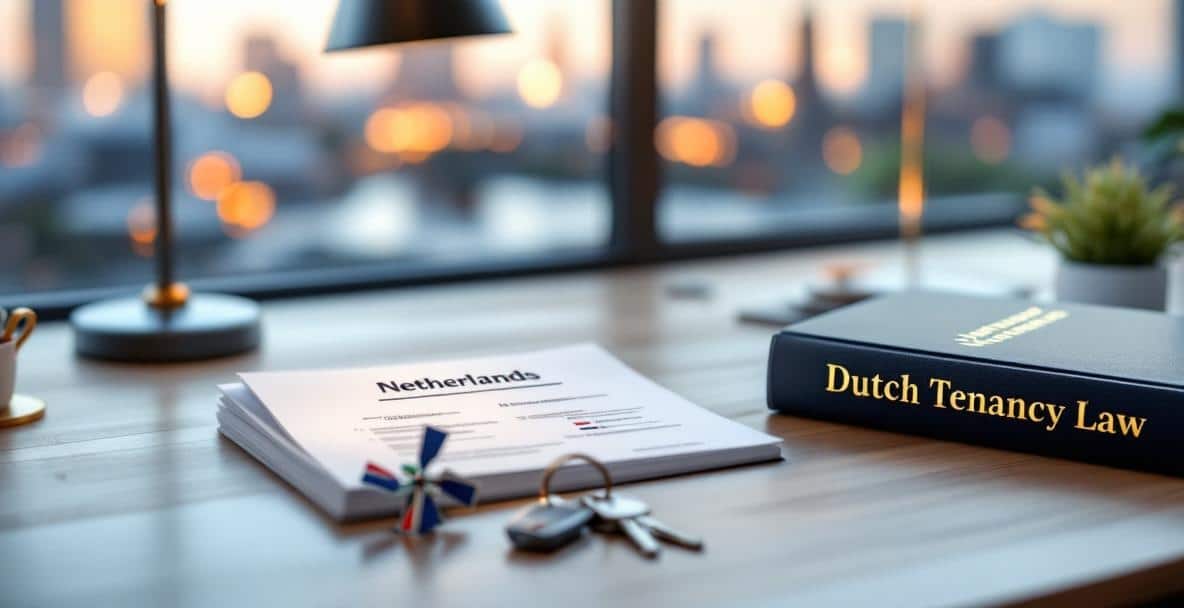If renting in the Netherlands feels like a maze, you’re not alone. The rules here can be tricky, especially if you’re new or from abroad. Whether you’re renting a home or letting a property, understanding the legal framework can save you a lot of trouble. At Law & More, we help many people sort out these issues, and this guide explains Dutch rental rules in plain, friendly language.
Getting Started Your Guide to Dutch Tenancy Law

Why It Pays to Know the Rules
Dutch rental laws are known for their strong tenant protections and clear guidelines. Whether you rent or let, knowing what the law says is not just useful-it can help you dodge costly problems. These rules cover everything from rent limits to when a landlord can end a lease. For those coming from another country, the Dutch system might seem very different, so learning the local rules is very important.
A Glimpse into Dutch Renting Culture
In the Netherlands, housing is a mix of social homes, private rentals, and owner-occupied properties. This blend shows the Dutch commitment to accessible housing for everyone. The government keeps a close watch on the rental market to keep homes affordable and well maintained, especially in social housing. In busy cities like Amsterdam, Eindhoven, and Rotterdam, the competition for a good rental can be fierce. Knowing your rights and duties gives you a real advantage when looking for a place.
Rental Contracts in the Netherlands: What You Need to Know

Breaking Down Your Rental Agreement
Rental agreements in the Netherlands usually come in two flavors. One type is a fixed-term contract, which lasts for a set period. They used to switch automatically to open-ended leases if not canceled correctly. Now, the rules let you have fixed-term agreements that last up to two years for independent housing and up to five years for rooms. With the right notice, these contracts end on time.
The other type is an open-ended contract that continues until one party gives notice following legal rules. These leases offer extra security for tenants because landlords can only end them for clear legal reasons. In most cases, tenants can leave whenever they want, as long as they honor the notice period, usually one month.
A good rental contract should clearly list the basics: the rent amount, what is included, the lease duration, who handles repairs, the house rules, and the terms of termination. It is smart to have a lawyer review your contract before you sign so that it meets Dutch law and protects your interests.
Avoiding Common Contract Traps
Both tenants and landlords can run into trouble when a contract is vague or unfair. One tricky issue is the “diplo clauses” that try to sidestep tenant rights by saying the property is only temporarily available because the owner is abroad. Judges usually knock these clauses down if they try to weaken tenant protections.
Service costs and utilities also cause confusion. Landlords must give a yearly breakdown of the actual costs, and tenants have the right to ask for refunds if they end up overpaying. Many internationals are unaware of this and might pay too much without knowing better.
Finally, disagreements about who fixes what can be a real headache. The law normally requires landlords to take care of major repairs, while tenants handle small day-to-day fixes. Sometimes contracts try to shift these duties unfairly. Knowing the legal split can help you steer clear of unnecessary disputes and extra expenses.
For Tenants: Your Rights and What You Need to Do
What You Can Expect as a Tenant
If you rent in the Netherlands, you are well protected by law. Many places have rent control where the maximum rent is set based on property factors like size and condition. If you feel your rent is too high, you can ask the Huurcommissie (Rent Tribunal) to review it within six months of moving in.
You also have a right to privacy and a peaceful home. Landlords are not allowed to enter without permission unless there is a real emergency. Any agreement that gives a landlord endless access will not stand under Dutch law.
One of the strongest protections is against eviction. Landlords can only cancel a lease for clear reasons, such as urgent personal use, major renovations, or serious tenant misconduct. Even then, they must get a court order, which gives you plenty of time to challenge any decision.
You are usually free to make small changes to your home, like painting or hanging pictures, without needing permission. For bigger modifications, however, you must get the landlord’s approval-and they cannot refuse without a good reason.
What You Need to Do
Along with your rights come clear responsibilities. You must pay your rent on time, usually by the first day of the month. Late payments can lead to eviction, although courts often give you a chance to catch up.
It is important to use the property as intended. Turning your home into a business space without permission or subletting without approval can break your lease.
Keeping the property in good shape is also on you. This means handling small repairs, like changing light bulbs or unclogging drains, and taking care of day-to-day cleaning to prevent issues like mold. Doing these little tasks can help you avoid unnecessary hassles later.
Finally, be mindful of your neighbors. Avoid causing noise or disturbances because ongoing problems can lead to your contract being ended after repeated warnings.
For Landlords: Your Powers and Duties

What Landlords Can Expect and Enforce
Dutch law gives strong rights to tenants, but as a landlord, you still have important powers. You are entitled to receive timely rent payments and may charge a late fee if that is mentioned in the contract. If a tenant falls behind for about three months or more, you can start eviction proceedings.
You can also set fair rules about how the property is used. This might mean having limits on pets, smoking, or making major changes to the property, as long as these rules do not violate tenant rights.
For fixed-term leases made after July 2016, the contract will automatically end if you provide proper notice (at least one month for houses and three months for rooms). In open-ended leases, you can only end the agreement if there are strong reasons such as repeated missed payments, serious misconduct, or an urgent personal need for the property.
You are allowed to raise the rent once a year if you follow the proper legal steps. In regulated properties, there is a government-set cap on the annual increase. For higher-rent properties, any increase must be fair and clearly spelled out in the contract.
Landlord Duties: Keeping Things Fair
It is your duty to make sure the property is safe and in good condition. This means keeping the building sound, all utilities working, and fixing issues like leaks or heating problems quickly. Taking care of repairs is key to tenant satisfaction.
You must also be transparent with financial matters. Each year, provide a detailed breakdown of service costs and refund any extra payments. You are not allowed to profit from these fees-they should only cover the actual expenses.
Respecting your tenant’s privacy is crucial. Outside of genuine emergencies, always schedule visits and ask for permission before entering the property. This is a legal requirement that cannot be bypassed by any contract.
If you decide to raise the rent, you must follow the correct process by giving written notice at least two months before it takes effect. For regulated homes, any increase must stay within the limits set by the government.
When ending a tenancy, you must provide proper notice and have a valid legal reason. Simply wanting to rent to someone else or charge higher rent is not enough. Harassing tenants or cutting off their utilities to force them out is illegal and can lead to severe penalties.
Sorting Out Problems

Where Disputes Usually Arise
Most rental conflicts boil down to a few common issues. Arguments over who should handle repairs or whether tasks have been done properly are frequent. Disagreements about rent increases, especially if tenants feel an increase is unfair, also cause tension.
Deposit refunds can be tricky as well, with debates over whether damage goes beyond normal wear and tear. Confusion about service charge documentation and calculations often sparks further disagreement.
Noise complaints or other neighbor issues can lead to conflicts between tenants, landlords, and neighbors alike. Disputes may also arise when one party challenges the validity or terms of ending the lease.
How to Work Through Disputes
The best first step is to talk things out directly. Often, a simple, honest conversation can clear up misunderstandings. It helps to put your concerns in writing, mention the key parts of your contract, and suggest fair solutions.
If talking does not resolve the issue, mediation is a good next option. A neutral third party can often help settle differences. Organizations like the Juridisch Loket offer free advice, and some municipalities even provide mediation services.
For rent issues in regulated properties, the Huurcommissie (Rent Tribunal) can assist. This option requires a filing fee of €25 for tenants and €300 for landlords, which may be refunded for the winning party. The Tribunal can rule on matters such as rent limits, service charges, and repair disputes.
When a case does not fall under the Huurcommissie’s jurisdiction or applies to more liberal rental agreements, the cantonal court (kantonrechter) becomes the next step. Although these proceedings are more formal, they are still accessible, and you might not always need a lawyer. However, getting legal advice is usually wise.
Always keep records of communications, note dates on important documents, and save all receipts. This documentation can be a game-changer when working through any conflicts.
Wrapping It Up: Your Rental Roadmap
Key Takeaways
This guide has covered the ins and outs of Dutch renting laws in clear terms. Whether you are renting or letting, understanding your rights and responsibilities can save you from future trouble. When both tenants and landlords know the rules, agreements tend to be smoother, fairer, and lead to fewer disputes.
Where to Turn for More Advice
For extra details, visit trusted websites like Rijksoverheid.nl to get official information on housing rules. Free legal advice is available from the Juridisch Loket, and tenant groups such as Woonbond offer additional support and legal aid.
Need professional assistance with your tenancy issues? At Law & More, our multilingual experts specialize in Dutch housing law. Our team can help with contract reviews, legal advice, and representation. Contact Law & More B.V. today to schedule a consultation.
